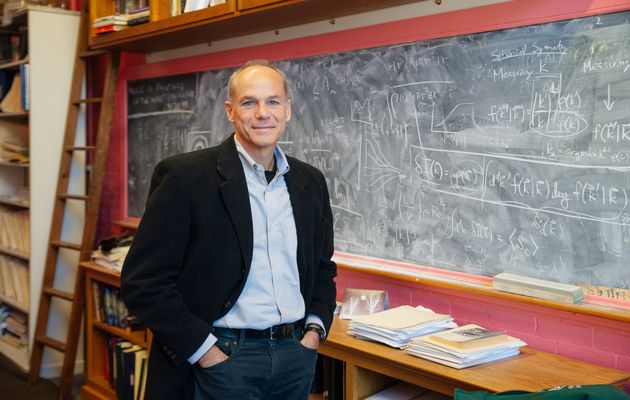Templeton Prize winner Marcelo Gleiser: “Science does not kill God”
The Brazilian physicist defends “a complementary approach to knowledge, especially on questions where science cannot provide a final answer”.
PHILADELPHIA · 29 MARCH 2019 · 08:50 CET

The Brazilian theoretical physicist and cosmologist, Marcelo Gleiser, has been awarded the 2019 Templeton Prize.
According to the John Templeton Foundation, Gleiser is “a leading proponent of the view that science, philosophy, and spirituality are complementary expressions of humanity’s need to embrace mystery and the unknown”.
FIRST LATIN AMERICAN TO WIN TEMPLETON PRIZE
Gleiser is a professor of Natural Philosophy, physics and astronomy at Dartmouth College in Hanover, New Hampshire (US). He is internationally known for his books, essays, blogs, TV documentaries, and conferences, which “present science as a spiritual quest to understand the origins of the universe and of life on Earth”.
He becomes the first Latin American to be awarded the Templeton Prize. In Brazil his books are best-sellers and his television series have millions of viewers.
“SCIENCE ALONE CANNOT LEAD TO ULTIMATE TRUTHS”
In the last 35 years, Gleiser has investigated “a wide array of topics, ranging from the behaviour of quantum fields and elementary particles, to early-universe cosmology, the dynamics of phase transitions, astrobiology, and new fundamental measures of entropy and complexity based on information theory”, the Foundation explains.
With more than 100 peer-reviewed articles published, he “is a prominent voice among scientists, past and present, who reject the notion that science alone can lead to ultimate truths about the nature of reality”, they add.
That is why Gleiser publicly talks about the historical, philosophical, and cultural links between science, the humanities, and spirituality, and defends “a complementary approach to knowledge, especially on questions where science cannot provide a final answer”.

“SCIENCE DOES NOT KILL GOD”
"The first thing you see in the Bible is a story of Creation. Whatever your religion, everybody wants to know how the world came to be”, Gleiser told French news agency AFP after receiving the prize.
He added: “Believers position science as the enemy, because they have a very antiquated way of thinking about science and religion in which all scientists try to kill God, but science does not kill God”.
“AN ENGAGEMENT WITH THE MYSTERIOUS”
Gleiser believes science is an “engagement with the mysterious”. His doctrine of “humancentrism” states that “modern science has brought humankind back to the metaphorical center of creation, by revealing the improbable uniqueness of our planet, and the exceptional rarity of humans as intelligent beings capable of understanding the importance of being alive”.
“This inversion of Copernicanism prompts the need for a new cosmic morality where the sacredness of life is extended to the planet and all living beings”, he points out.
In his videotaped acceptance of the prize, Gleiser said that “the path to scientific understanding and scientific exploration is not just about the material part of the world”.
“My mission is to bring back to science, and to the people that are interested in science, this attachment to the mysterious, to make people understand that science is just one other way for us to engage with the mystery of who we are”, he added.
“TO AFFIRM THE NON-EXISTENCE OF GOD IS NOT SCIENTIFICALLY CONSISTENT”
While he describes himself as an agnostic, he also rejects atheism, because he sees it “as being inconsistent with the scientific method as it is, essentially, belief in non belief”, Gleiser said in a 2018 interview in Scientific American.
“You may not believe in God, but to affirm its non-existence with certainty is not scientifically consistent”, he added.
Gleiser pointed out that “it’s extremely arrogant from scientists to come down from the ivory towers and make these declarations without understanding the social importance of belief systems”.
Marcelo Gleiser will formally receive the Templeton Prize at a ceremony in The Metropolitan Museum of Art’s Grace Rainey Rogers Auditorium in New York City on Wednesday, May 29.
ABOUT THE TEMPLETON PRIZE
The Templeton Prize “honours a person who has made an exceptional contribution to affirming life’s spiritual dimension, whether through insight, discovery, or practical works”.
The award, valued at £1.1 million (about €1.3 million or $1.4 million), is one of the world's largest annual individual awards and bigger than the Nobel Prize.
The Foundation “supports research on subjects ranging from complexity, evolution, and emergence to creativity, forgiveness, and free will”.
Gleiser joins a group of 48 Prize recipients including Mother Teresa, who received the inaugural award in 1973. The 2017 Laureate was the American philosopher Alvin Plantinga, while in 2015 the prize was for Canadian philosopher and theologian Jean Vanier, founder of L’Arche.
Published in: Evangelical Focus - science - Templeton Prize winner Marcelo Gleiser: “Science does not kill God”
